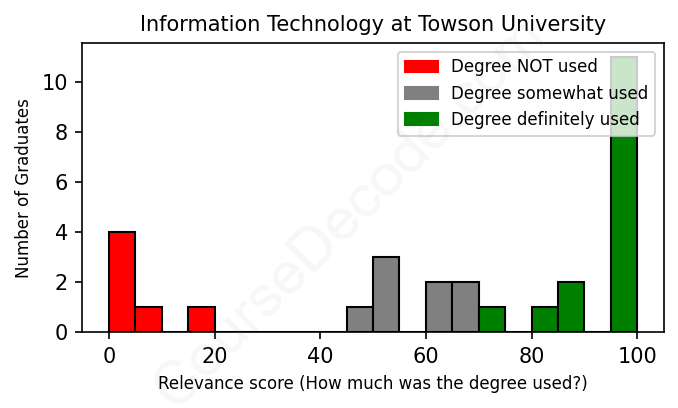
First, some facts. Of the Information Technology graduates from Towson University we've analyzed , here's how many have used (or NOT used) their degree in their career:

These are estimates based on AI analysis of 29 LinkedIn profiles (see below).
The verdict? Slightly below average. Overall, with an average relevance score of 65%, Information Technology graduates from Towson University have a slightly lower likelihood (-2%) of finding work in this field compared to the average graduate across all fields:
And for comparison, here's the chart for all profiles we've looked at across all degrees.
Also, after graduating, only 6% of these graduates have pursued further education other than another Bachelor's degree (such as a Masters degree or other), compared to the average across all profiles of 35%. This suggests a Bachelors degree is enough for most Information Technology graduates, and it's normal to look for work straight after graduation.
See the details:
|
Relevance score: 0% We think this person has NOT gone into a career related to their degree. We think this person has NOT gone into a career related to their degree.
DEGREE INFOGraduated in 2023 from Towson University with a Bachelor's degree in Information Technology. No other secondary education since. JOB HISTORY SINCE GRADUATIONMember Service Representative Navy Federal Credit Union Jul 2023 - Present ABOUTIT professional with a solid foundation in practical database design and implementation. Experienced in developing, testing, and executing scripting programs in a hands-on environment. Possess a comprehensive understanding of effective administration and maintenance of applications, operating systems, and networks, with a strong focus on proper documentation, policies, and procedures.KNOWLEDGE, SKILLS, AND ABILITIES: Programming Languages: Proficient in C++, Java, HTML, Python, JavaScript, and Batch Scripting.Database Management: Skilled in working with Microsoft SQL Server, MySQL, and Microsoft Access.Cloud Computing: Beginner level knowledge of AWS and Azure.Systems Administration: Familiarity with Windows CLI, Windows PowerShell, HTML, and SQL for system administration tasks.Virtual Machine Workspace: Experience in installing and configuring hypervisors, acquiring Windows and Linux operating systems, and setting up virtual machine environments.User Account Management: Capable of creating user accounts, implementing access controls, and managing permissions on both Windows and Linux operating systems.Software Installation Automation: Proficient in automating software installation processes. |
The top 10 most common jobs done by the graduates we've analyzed (ranked most common to least) are:
After looking at the jobs held by recent graduates of Towson University with degrees in Information Technology, it's pretty clear that a significant number of them ended up in roles that are directly related to their field. Many graduates found positions such as IT Support Technicians, System Administrators, and Software Developers, where they are actively using their technical skills and knowledge acquired during their studies. These types of roles allow them to apply their understanding of networks, programming, and system management, making them quite relevant to the Information Technology world.
However, not everyone from this program ended up in tech-specific positions. Some graduates took on roles in customer service, sales, or other areas that weren't directly related to IT. For example, jobs like servers, sales associates, or even program managers that don't focus exclusively on technical tasks can be found in their profiles. While some of these positions might use a few transferable skills, they generally don't require the core IT knowledge that the graduates built throughout their education. So, while there's a good amount of relevance in many graduates' job choices, a notable number finding themselves in unrelated fields shows a mix of the job market's demands and personal career trajectories.
Here is a visual representation of the most common words in job titles for Information Technology graduates (this is across all Information Technology graduates we've analyzed, not just those who went to Towson University):

It looks like Towson University’s Information Technology graduates generally carve out pretty solid career paths after finishing their degrees. Most of these students seem to kick off their careers with positions like IT Interns, Support Technicians, or even entry-level roles within larger organizations. Over time, many have moved on to more advanced roles, often within IT management, software development, or specialized technical positions. For example, graduates from 2014 have landed into significant roles like IT Field Service Manager or positions with the National Security Agency, which is pretty impressive! By five years after graduation, a good number of people are already stepping into managerial roles, taking on responsibilities that require more experience and knowledge.
Looking further down the line, around ten years out, many graduates are holding strong positions that strongly relate to their IT degrees, such as Cyber Systems Engineer, IT Managers, and even specialized roles like DevOps Engineer. There’s definitely a pattern where many seem to stick to the tech field and grow their careers, rather than shifting to unrelated sectors. Of course, there are some who have taken detours or ended up in various roles that aren't directly tied to Information Technology, but overall, the majority appear to be thriving in relevant careers. So, if you're considering a degree in Information Technology from Towson, you can be hopeful about the career opportunities it could open up for you!
Honestly, a Bachelor’s degree in Information Technology can be a bit of a mixed bag, and it really depends on your background and interest in tech. At Towson University, you can expect some of the classes to be pretty challenging—things like programming, systems analysis, and networking can get intense, especially if you're not super into computers and tech concepts. But if you've got a knack for problem-solving and a genuine interest in the subject, it can also be really rewarding and manageable. Generally speaking, it’s about average in terms of difficulty compared to other degrees; you’ll have your tough moments, but there are plenty of resources and support to help you out along the way. So, if you're excited about IT, it might actually end up being more fun than hard!
Most commonly, in the LinkedIn profiles we've looked at, it takes people 4 years to finish a Bachelor degree in Information Technology.
Looking at the job paths of these Towson graduates, it seems like there’s a mix of decent and not-so-great financial outcomes. Some of them, especially those who landed roles at places like Northrop Grumman or the NSA, likely pulled in pretty good salaries right out of college. On the other hand, some folks started with more basic jobs, like working as associates at retail stores or doing internships that probably didn’t pay much initially. It seems like a lot of them gradually moved up in their careers, which is great, but the early career stages look a bit rough for some. Overall, I’d say there’s potential for decent money in IT if you stick with it, but it doesn’t always start strong for everyone.
Here is a visual representation of the most common words seen in the "about" section of LinkedIn profiles who have a Bachelor degree in Information Technology (this is across all Information Technology graduates we've analyzed, not just those who went to Towson University). This may or may not be useful:

Here are all colleges offering a Bachelor degree in Information Technology (ordered by the average relevance score of their Information Technology graduates, best to worst) where we have analyzed at least 10 of their graduates: